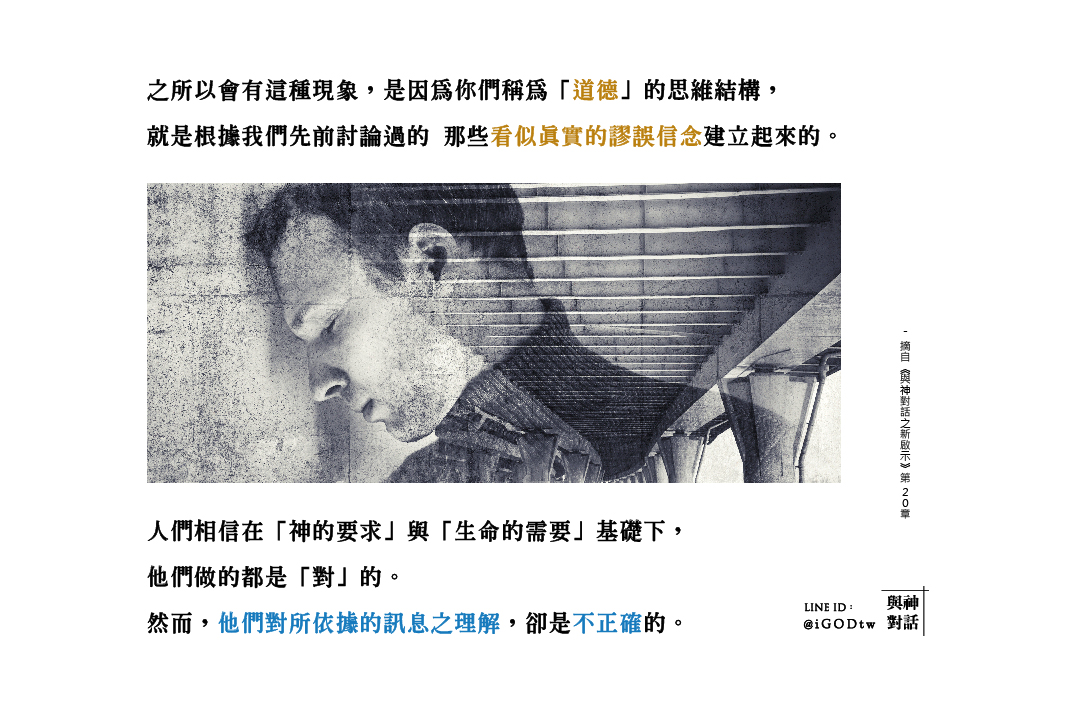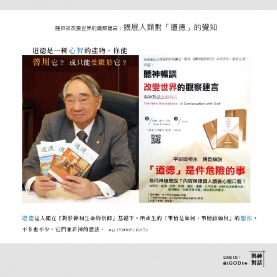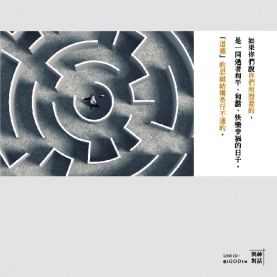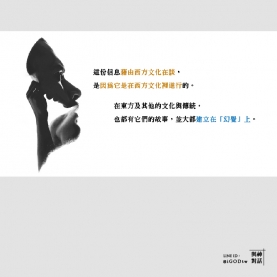觀察並非一定帶有評判。擴展意識並非去推翻否定現況,而是去讓它增添(add)和擴大(expand)覺知,以看見更大的全貌。
綜觀人類歷史,確實可清楚發現如神所言:「道德」是一件危險的事。因為道德是一種頭腦心智的產物,道德只是一種人類在對於神和對於生命的信仰基礎下所產生的「事情該如何」的想法。然而,那些想法所依據的訊息和詮釋,卻是謬誤的!

聽神談【人類稱為「道德」 之社會習俗】:2/3 篇
尼爾:許多人說,只要人們謹守稱爲「道德」的思維結構模式,就會行得通!他們認爲之所以阻礙我們和平共處的原因,是因爲人們和各國不敬重這種模式架構。他們認爲不是「哲理的建構模式」有謬誤,而是人們的行爲出了問題。
然而,他們許多最具傷害性的行爲,卻是根據這種結構模式而來的。
以人類的尺度和標準而言,你們會說許多人是:當他們認爲自己的行爲表現得最好時,卻正是他們的行爲表現得最糟的時候。
尼爾:喔,這聽起來有點難過。
對這些行爲(或人類的其他作爲)我不做評判。然而,若人們說他們所尋求與渴望的是和平、和諧地生活,大家可以留意看看,當他們說自己在力求最好的行爲表現時,卻往往做出無法導致和平與和諧的事。
尼爾:可否給我一個例子?
我可以舉出上百個例子。
例如,一位父親將未婚懷孕的女兒趕出家門;或是訓斥娶了一個異教徒或異族女子的兒子;或是一個家庭不承認有同性戀傾向的孩子。
還有那位身上綁著炸彈的二十三歲婦人,走入耶路撒冷的人群中將炸彈引爆…等(《與神對話之新啟示》書上還有其他例子)。
人們會做出像上述的這一些事,是因爲他們在做出了「道德」的評斷。

這一切的扭曲對你們而言似乎是「正確」的,之所以會有這種現象,是因爲你們稱為「道德」的思維結構,就是根據——我們先前討論過的——看似真實的謬誤信念建立起來的。
人們相信在「神的要求」與「生命的需要」基礎下,他們做的都是「對」的。然而,他們對所依據的訊息之理解,卻是不正確的。
而這正是爲什麼常常在人們過度專注於道德時,往往發生許多困難,而不是在人們忽視道德時。
(敬請持續關注、共同檢視神談有關「如何擴展人類對於『道德』的覺知」的觀察建言。)
摘自《與神對話之新啟示》第 20章
Neale: Many say that it would be working if people would just adhere to this "mental construction" called "morality"! They say that what stops us from living together peacefully is that people and nations do not honor this construction. They say that it's not the philosophical construction that is at fault, it's people's behavior.
And yet, many of their most damaging behaviors are based on this construction.
By human measurements and human standards, you would say that many people act their worst when they think they are acting their best.
Neale: Ouch. That's tough to hear.
I have no judgment about these behaviors (or anything else that humans do), but if humans say that what they seek and desire is to live in peace and harmony, they may notice that they often do things when they say they are acting their best that do not lead to peace and harmony.
Neale: Can you give me an example?
I can give you hundreds of them.
How about a father kicking out his unwed pregnant daughter? Or rebuking his son because he married outside the faith or outside the race? Or a family disowning a child for being gay?
How about a 23-year-old woman strapping a bomb to her body and walking into a crowd in Jerusalem to set it off?
People do things like this because they are making moral judgments.
This twisting of everything that to you seems "right" occurs because your construction of "morality" itself is based on the fallacies we've discussed earlier.
People think they are doing "right," based on what they believe that "God wants" or that "Life requires"—yet their information on that is inaccurate.
And that is why, often, it is not when people ignore morality that difficulties arise, but when people pay too much attention to it.








